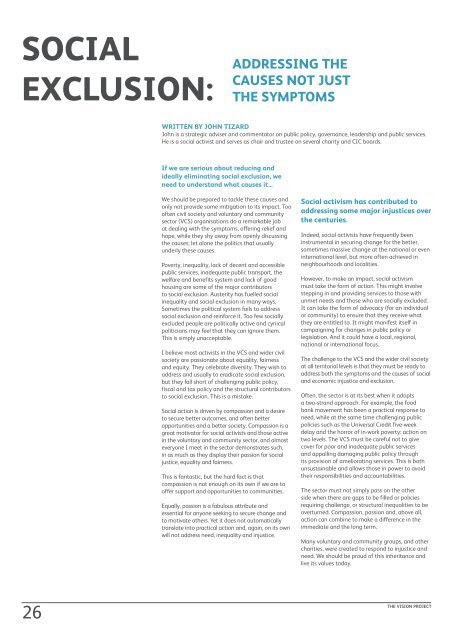The Vision Project
Throughout 2019, Developing Health & Independence (DHI), have been marking their 20th anniversary as a charity by looking to the future. Through articles, events and podcasts, they've asked people to answer the question of how we can achieve their vision of ending social exclusion. This collection of articles includes the contributions of experts from across public life and the political spectrum.
Throughout 2019, Developing Health & Independence (DHI), have been marking their 20th anniversary as a charity by looking to the future. Through articles, events and podcasts, they've asked people to answer the question of how we can achieve their vision of ending social exclusion. This collection of articles includes the contributions of experts from across public life and the political spectrum.
You also want an ePaper? Increase the reach of your titles
YUMPU automatically turns print PDFs into web optimized ePapers that Google loves.
SOCIAL<br />
EXCLUSION:<br />
ADDRESSING THE<br />
CAUSES NOT JUST<br />
THE SYMPTOMS<br />
WRITTEN BY JOHN TIZARD<br />
John is a strategic adviser and commentator on public policy, governance, leadership and public services.<br />
He is a social activist and serves as chair and trustee on several charity and CIC boards.<br />
If we are serious about reducing and<br />
ideally eliminating social exclusion, we<br />
need to understand what causes it...<br />
We should be prepared to tackle these causes and<br />
only not provide some mitigation to its impact. Too<br />
often civil society and voluntary and community<br />
sector (VCS) organisations do a remarkable job<br />
at dealing with the symptoms, offering relief and<br />
hope, while they shy away from openly discussing<br />
the causes; let alone the politics that usually<br />
underly these causes.<br />
Poverty, inequality, lack of decent and accessible<br />
public services, inadequate public transport, the<br />
welfare and benefits system and lack of good<br />
housing are some of the major contributors<br />
to social exclusion. Austerity has fuelled social<br />
inequality and social exclusion in many ways.<br />
Sometimes the political system fails to address<br />
social exclusion and reinforce it. Too few socially<br />
excluded people are politically active and cynical<br />
politicians may feel that they can ignore them.<br />
This is simply unacceptable.<br />
I believe most activists in the VCS and wider civil<br />
society are passionate about equality, fairness<br />
and equity. <strong>The</strong>y celebrate diversity. <strong>The</strong>y wish to<br />
address and usually to eradicate social exclusion,<br />
but they fall short of challenging public policy,<br />
fiscal and tax policy and the structural contributors<br />
to social exclusion. This is a mistake.<br />
Social action is driven by compassion and a desire<br />
to secure better outcomes, and often better<br />
opportunities and a better society. Compassion is a<br />
great motivator for social activists and those active<br />
in the voluntary and community sector, and almost<br />
everyone I meet in the sector demonstrates such,<br />
in as much as they display their passion for social<br />
justice, equality and fairness.<br />
This is fantastic, but the hard fact is that<br />
compassion is not enough on its own if we are to<br />
offer support and opportunities to communities.<br />
Equally, passion is a fabulous attribute and<br />
essential for anyone seeking to secure change and<br />
to motivate others. Yet it does not automatically<br />
translate into practical action and, again, on its own<br />
will not address need, inequality and injustice.<br />
Social activism has contributed to<br />
addressing some major injustices over<br />
the centuries.<br />
Indeed, social activists have frequently been<br />
instrumental in securing change for the better,<br />
sometimes massive change at the national or even<br />
international level, but more often achieved in<br />
neighbourhoods and localities.<br />
However, to make an impact, social activism<br />
must take the form of action. This might involve<br />
stepping in and providing services to those with<br />
unmet needs and those who are socially excluded.<br />
It can take the form of advocacy (for an individual<br />
or community) to ensure that they receive what<br />
they are entitled to. It might manifest itself in<br />
campaigning for changes in public policy or<br />
legislation. And it could have a local, regional,<br />
national or international focus.<br />
<strong>The</strong> challenge to the VCS and the wider civil society<br />
at all territorial levels is that they must be ready to<br />
address both the symptoms and the causes of social<br />
and economic injustice and exclusion.<br />
Often, the sector is at its best when it adopts<br />
a two-strand approach. For example, the food<br />
bank movement has been a practical response to<br />
need, while at the same time challenging public<br />
policies such as the Universal Credit five-week<br />
delay and the horror of in-work poverty: action on<br />
two levels. <strong>The</strong> VCS must be careful not to give<br />
cover for poor and inadequate public services<br />
and appalling damaging public policy through<br />
its provision of ameliorating services. This is both<br />
unsustainable and allows those in power to avoid<br />
their responsibilities and accountabilities.<br />
<strong>The</strong> sector must not simply pass on the other<br />
side when there are gaps to be filled or policies<br />
requiring challenge, or structural inequalities to be<br />
overturned. Compassion, passion and, above all,<br />
action can combine to make a difference in the<br />
immediate and the long term.<br />
Many voluntary and community groups, and other<br />
charities, were created to respond to injustice and<br />
need. We should be proud of this inheritance and<br />
live its values today.<br />
26<br />
THE VISION PROJECT




